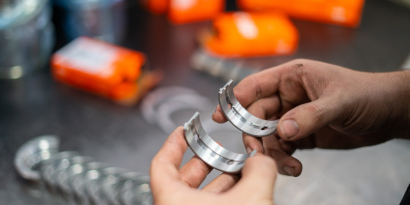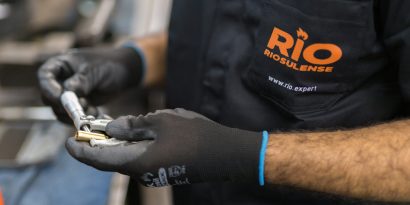Being the holder of a particular knowledge has always placed professionals in a prominent place in the market. Until recently, sharing this wisdom was rare. However, today, dividing it has become a strategy to be recognized as an authority within its area of expertise. For the owner of a mechanic workshop who has specific skills on a particular technique, this can be a good opportunity to increase business income with training for mechanics.
That’s what you understood! A mechanic can use his expertise in some workshop matters to create a new source of income within the business. But stay tuned: we are not talking about taking a course to teach you how to calibrate tires or change the oil. Here, the differential that will attract the attention of other mechanical professionals is the offer of very specific and current themes, generally those that few really master.
Ideally, training for mechanics should be developed to show professionals that knowledge has the power to broaden horizons and promote more critical views on work routines. You, who are the Expert, need to make it clear that with new ways of working, which will certainly involve modern technologies , it is possible to optimize processes and even reduce costs and waste.
Speaking like that, it seems like a simple thing to do, however, we know that offering any type of course to other people always requires a minimum of organization and planning. And that is precisely why we have prepared this article, to help you prepare training for mechanics efficiently and turn them, in fact, into a new source of revenue for your workshop.
How to prepare training for mechanics efficiently
If you are the owner and run a machine shop, you certainly know that for a project to get off the ground in the right way, the first step is to develop a good plan. So, if your goal is to start training for mechanics, take the time to list what your material needs will be in this new endeavor.
Be sure to also predict which profit you intend to obtain and, consequently, what will be the amounts charged per participant. After all, one of the main objectives of passing on your knowledge acquired in years of practice to other professionals is to increase the profit margins of the workshop, right? With all this in mind, check out what your organization cannot miss:
1 – The definition of an adequate space for classes
As your knowledge is based on the specialized service of the workshop, the ideal is that the class space is prepared right there. This does not mean that you need to build a new room or something, but it is necessary that the space be adapted to be a learning environment, in which it is possible to make a video presentation, an explanation on a board or even use a projector, for example.
Being inside the workshop still makes part of the practical classes easier, as you can rely on your own tools without having to carry them around – this is good because it helps prevent loss and damage to your equipment. And bringing in mechanics from abroad to get to know your business also ends up being a showcase for your workshop, and may even attract new talent to the staff. A good team is always synonymous with good service and more customers: and that is what everyone wants!
2 – The separation of practical and theoretical material
Regardless of whether training for mechanics is more practical or more theoretical, it is important to separate and organize all the material that will be used. If there is a theoretical part, it is interesting to print a small booklet or even deliver the sheets inside a folder, so that no one is at risk of losing the information. Over time, you can think about the possibility of launching a website or using a platform to make all the material available online, eliminating the use of paper.
In the case of practical classes, it is essential that all tools and equipment to be used are available. Oh, and as we are talking about specialized training, there will generally not be an item for each student, but it is essential that everyone can “get their hands dirty” at least once. Therefore, the choice of the type of material used is also related to the time of each activity, which is the subject of our next item in the organization.
3 – Establishing time for training
We are talking about training for mechanics, who are professionals who have a long and heavy daily workday. So, when planning the duration of classes, it is necessary to take this point into consideration. This includes considering whether it is worth taking courses on weekends, which are the days of rest for these professionals.
Another important issue is to merge theory and practice. Remember that you are dealing with adults, in most cases, who already know the basics and have used your training to learn something extraordinary. Use your time wisely to add value to the profession of the people who trusted you, as this will return to your business in credibility and cash flow.
4 – The decision on the price of training
It is not always easy to price something you have never worked with, but you have to start somewhere. If the only price you know how to put is on your own workforce in the workshop, start with it. Let’s say that a specialized service geared towards automatic currency exchange costs R $ 500.00 and takes 4 hours to complete – that’s R $ 125.00 per hour, right?
If you are going to conduct a training on this topic, you can start from that hourly rate to make the training price. But be aware: this account alone is not enough to close the ideal amount. It is still necessary to include the expenses with the material that will be used, the organization of the space, the increased use of electricity, water and other inputs and, of course, the fact that you have the knowledge, which is its added value. Just don’t overdo it, the price of the training must be compatible with the value that the service represents in the market.
5 – Delivery of certificate of completion
Even if it is not a technical course or offered by a college, in the specific subject of the training, the specialist is you. So, if your workshop, which is specialized, opens the door to teaching methods and practices to other professionals, it needs to be clear and proven what they learned, where they learned and with whom.
If you have any doubts about how classes will be taught, make a pilot with your own employees. In this way, it is possible to observe problems, correct flaws and make the necessary adjustments before the official start. At this stage, details can make a big difference, so check the duration of the course, the size of the space for the number of places, the amount of material available and the best way to register and receive payments. With everything cleared up, you can now go on to training with external professionals.
We hope you enjoyed the content and, who knows, you can implement a training program there in your workshop. If you already do this type of activity, what do you think about sharing your experience with us in the comments? Just use the space below.





